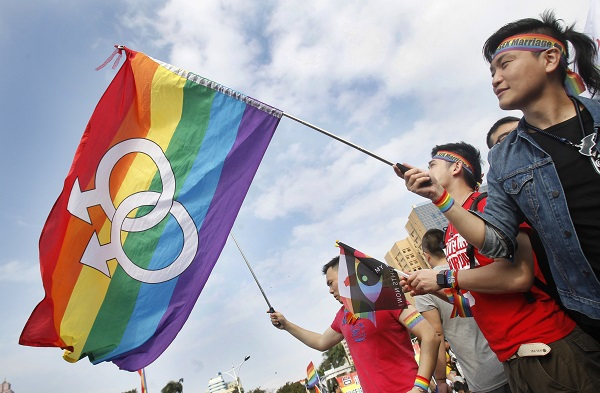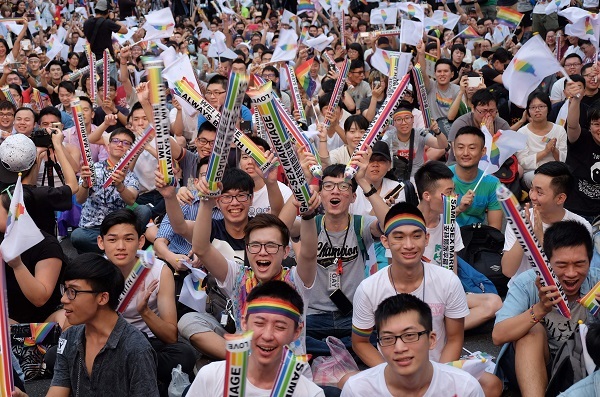BEIJING - Taiwan's giant step towards allowing same-sex marriage has reverberated across Asia, but activists warn the fight for equality isn't over in a region where gay sex remains illegal in some countries.
Challenges to an Asia-wide embrace of same-sex unions were highlighted by this week's caning of two Indonesian men as punishment for gay sex and a South Korean military court's jailing of a soldier for having intercourse with another man.
In mainland China, two men lost a court battle to get married last year.
 |
In this Dec. 10, 2016, file photo, supporters of LGBT and human rights wave rainbow flags during a rally supporting a proposal to allow same-sex marriage in Taipei, Taiwan, on the World Human Rights Day. (AP) |
But activists are hopeful that the push for marriage rights will be reinvigorated by Taiwan's constitutional court decision, which paves the way for the island to become the first place in Asia to allow same-sex couples to tie the knot.
The court ruled Wednesday that laws preventing same-sex unions violated the constitution's guarantees of freedom of marriage and gave the government two years to implement the decision.
"We're very happy," said Vuong Kha Phong, a rights assistant at iSEE advocacy group in Vietnam. "This is a historic victory for the LGBT groups in Asia."
The first domino?
Gay marriage is currently legal in only around 20 countries around the world, 13 of which are in Europe. New Zealand also allows same-sex couples to legally marry.
Taiwan is seen as one of the most progressive societies in Asia when it comes to gay rights.
"While I think it is still a long way to the equality dominos falling all over Asia, I think a few East Asian countries, such as Japan and Vietnam, may be more ready to consider equality legislation," Ray Chan, Hong Kong's first openly gay lawmaker, told AFP.
"I can foresee many couples in Hong Kong will try to get married in Taiwan. When they return home, they will press the government and even the private sector for recognising them because the current laws, policies, and rules are blatantly discriminatory."
In Vietnam, which is seen as socially progressive on LGBT issues and where a vibrant gay scene flourishes online and in some big cities, hopes for marriage reform have stalled.
But iSEE's Phong said the Taiwan ruling "will give us momentum to mobilise the community to take action -- to do something so that gay marriage can be considered when lawmakers discuss changing the marriage law in 2020."
Gay activists in China expressed optimism that their country's cultural connections with Taiwan could help their efforts to change the law on same-sex nuptials.
Homosexuality was officially decriminalised in 1997 but only taken off the list of psychiatric disorders four years later.
"Taiwan and mainland China have the same roots and culture so it suggests that Chinese society could also accept the idea of gay marriage," said Li Yinhe, a renowned Chinese sexologist who has pressed Beijing policymakers on the issue.
There have been small signs of progress. While a Chinese court last year ruled against two men seeking to marry, the fact the case even made it into the judicial system was seen by many as an achievement.
"I am very happy and very excited that homosexual marriage is legalised in Taiwan. It's a pity that the mainland has not taken this step," said Sun Wenlin, one of the men in the case.
"But I'm optimistic about the legalisation of same-sex marriage in China."
Elisabeth Lund Engebretsen, a senior lecturer at the University of Oslo's Centre for Gender Research, said Taiwan's court ruling "creates a momentum for putting this on the table as a political issue" in Asia.
 |
Same-sex activists hug outside the parliament in Taipei on May 24, 2017 as they celebrate the landmark decision paving the way for the island to become the first place in Asia to legalise gay marriage. (AFP) |
Gay sex illegal
South Korea allows homosexual acts between civilians but not military personnel and a high-profile legal challenge to the country's ban on same-sex marriage in 2015 by movie director Kim Jho Gwang-Soo and his long-time partner Kim Seung-Hwan failed.
"People say that it's too early for our society to handle but I think if there is an open debate about the troubles of sexual minorities then I hope South Korean society can also walk a similar path," said Lee Na-Ra from Solidarity for LGBT Human Rights of Korea.
Before they can consider marriage, activists must win other battles in places such as India, Singapore and Indonesia's Aceh province, where gay sex is still outlawed.
"Legally we are not even pressing for gay marriage now. We are being denied our fundamental right," said Manvendra Singh Gohil, one of India's most vocal gay rights activists. "We have to go step by step." (AFP)









